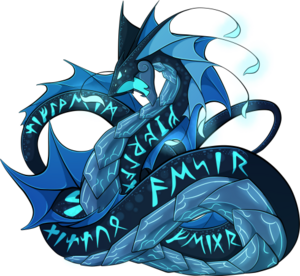Matmadyur Heimsins: Difference between revisions
imported>Konz (Simulated delve update) |
imported>Konz mNo edit summary |
||
| Line 55: | Line 55: | ||
*The runes on a Heimsins's body are real Norse words written in Anglo-Saxon Futhark and can be translated. | *The runes on a Heimsins's body are real Norse words written in Anglo-Saxon Futhark and can be translated. | ||
[[Category:Beta Releases]] [[Category:Aquatic]] [[Category:Chroma Coast]] [[Category:Creatures]] [[Category:Keileon]] [[Category:Reptilian]] [[Category:Super Rare]] | [[Category:Beta Releases]] [[Category:Aquatic]] [[Category:Chroma Coast]] [[Category:Creatures]] [[Category:Keileon]] [[Category:Reptilian]] [[Category:Reptilian Rendezvous]] [[Category:Super Rare]] | ||
Revision as of 17:27, 21 September 2021
The Matmadyur Heimsins is a Super Rare creature released on Protochroma during Beta. It is found only in Chroma Coast and Simulated Delve associated with its grouping, Reptilian Rendezvous. Its standard variant is Obsidian.
Descriptions
Baby
It's a perfectly spherical egg with a tough, leathery shell. Intricate, glowing patterns seem etched on the surface, but upon further inspection these appear to be natural grooves and markings on the shell.
Juvenile
Some sort of serpent has hatched from the egg. Though perfectly capable of breathing air, it refuses to leave the water of its volition and tends to respond by biting if one attempts to extract it. This proves to be a problem due to its alarmingly rapid rate of growth, quickly outgrowing any vessel of water it’s placed in. It has a tendency to see creatures smaller than itself as prey, necessitating it be kept away from other creatures one is taking care of. Hopefully it never grows into viewing its handler as a snack.
Adult
The Matmadyur Heimsins, known in short as the Matmadyur, is a spectacularly rare serpentine beast that lives primarily in deep ocean trenches. The species spends adolescence in shallower, coastal waters, preying on smaller fish and aquatic mammals; however, when they reach maturity, they begin moving into deeper water. Eventually its prey of choice shifts from coastal fare to much larger oceanic animals, including whales and smaller specimens of its own species. The Matmadyur is known to grow to great size as they grow older, and an upper limit has not been discovered. A mature adult can reach such great lengths that it becomes difficult to tell which way the coiling body is going, as its fins can easily bend in either direction; only its ventral scales are reliable for telling the beast's orientation.
Matmadyur are hostile and aggressive to smaller creatures, which they see as food. In the face of larger adversaries, the serpent will often hiss and bite but ultimately flee if the enemy is not deterred; this includes very young specimens reacting to researchers. The intelligence of the creature is unknown; they can be trained to perform basic tricks, but are ornery and stubborn—often refusing to perform tasks which they have exhibited the capacity to do before. Captive serpents certainly do display recognition and even preference of their handlers, as well as associations between good behavior and extra food, but it is unclear if they are only as intelligent as a dog or much cleverer—perhaps even sapient—than we currently can confirm.
Additional Lore
Delving
Reptilian Rendezvous
| Species | Image | Spawn Conditions | Additional Notes | Attacks | Weaknesses | Resistances |
|---|
| Matmadyur Heimsins |  |
Trap: Deep Water | Higher HP |
Images
| Image Type | Images | ||||||
|---|---|---|---|---|---|---|---|
| Baby |  |
-- | -- | -- | -- | -- | -- |
| Juvenile |  |
-- | -- | -- | -- | -- | -- |
| Common Adult |
 |
 |
 |
 |
 |
 |

|
| Rare Adult |
 |
 |
 |
 |
 |
 |

|
Trivia
- Though the creature's description states it is called a Matmadyur for short, most players call it a Heimsins instead.
- The creature's name is a slightly corrupted version of matmaður heimsins, which is Icelandic for "Eater of the World". It is based on Jörmungandr, the Norse World Serpent.
- The runes on a Heimsins's body are real Norse words written in Anglo-Saxon Futhark and can be translated.

